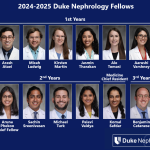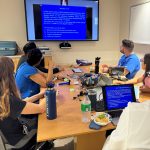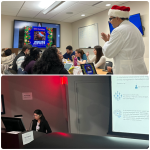Fellows are evaluated using tools based on the six competencies. Each fellow meets with the program director at least every 6 months to review progress, identify strengths and weaknesses, and to plan for the next period of training and ultimately for post training.
Patient Care
Global Rating by Attending each rotation
Procedure Log
Direct Observation (line placement, biopsy, CEX)
Clinic Performance Checklist
Hand off assessment (peer)
Medical Knowledge
Global Rating by Attending
Clinic Performance
Practice-Based Learning and Improvement
Global Rating by Attending
Standardized evaluation of Journal Club and Friday Conference presentations
Portfolio
Interpersonal & Communication Skills
Global Rating by Attending
Clinic performance checklist
Direct Observation (CEX)
Portfolio
Professionalism
Global Rating by Attending
Portfolio
Systems-Based Practice
Global Rating by Attending
Clinic Performance Checklist
Portfolio
The program is evaluated annually by the fellows and faculty. These data are used along with survey data from former fellows, the fellow survey, and board scores to make program improvements. This process is carried out by the Education Committee which includes at least two fellows as well as key clinical faculty.
Clinical Competency Committee
The Duke Nephrology Fellowship Training Program’s Clinical Competency Committee’s (CCC) role is to help demonstrate accountability as medical educators and ensure that graduates will provide quality care and safe care to our patients. The program will ensure that there are sufficient assessment tools to determine performance across competencies, including the use of milestone evaluations. The CCC will function to improve individual trajectories for fellows in our program. The CCC will help the Program Director provide constructive feedback to the trainees and provide the trainees with more immediate feedback. Milestones will be reported to the ACGME on a semi-annual basis. The details of the meetings will remain confidential. The program director will name the members of the CCC. The program director will not be the chair of the CCC, but can participate in the meeting as core faculty. The CCC will come up with individual action plans for all trainees. The chair of the CCC will report findings to the program director, which will facilitate semi-annual individual meetings between the program director and the trainee.



































































































































































































